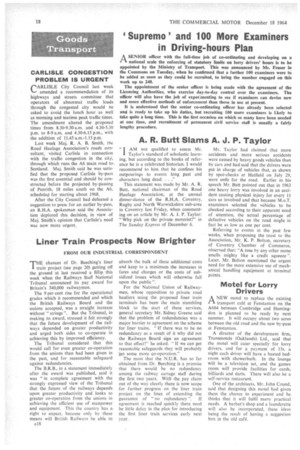Liner Train Prospects Now Brighter
Page 20

If you've noticed an error in this article please click here to report it so we can fix it.
FROM OUR INDUSTRIAL CORRESPONDENT
THE chances of Dr. Beeching's liner train project (see page 20) getting off the ground at last received a fillip this week when the Railways Staff National Tribunal announced its pay award for Britain's 340,000 railwaymen.
The 9 per cent rise for the operational grades which it recommended and which the British Railways Board and the unions accepted, was a straight increase without "strings ". But the Tribunal, in making its award, stressed it felt strongly that the future development of the railways depended on greater productivity and urged both sides to co-operate in achieving this by improved efficiency.
The Tribunal considered that this would call for even greater co-operation from the unions than had been given in the past, and for reasonable safeguard against redundancies.
The B.R.B., in a statement immediately after the award was published, said it was "in complete agreement with the strongly expressed view of the Tribunal that the future of the railways depends upon greater productivity and looks to greater co-operation from the unions in achieving the efficient use of manpower and equipment. This the country has a• right to expect, because only by these means will British Railways be able to
absorb the bulk of these additional costs and keep to a minimum the increases in fares and charges or the costs of subsidized losses which will otherwise fall upon the public ".
For the National Union of Railwaymen, whose opposition to private road hauliers using the proposed liner train terminals has been the main stumbling block to the start of these services, general secretary Mr. Sidney Greene said that the problem of redundancies was a major barrier to agreement on the scheme for liner trains. " If there was to be no redundancy as a result of it why did not the Railways Board sign an agreement to that effect?" he asked. "If we can get reasonable safeguards they will probably get some more co-operation."
The most that the N.U.R. has so far obtained from Dr. Beeching is a Promise that there would be no redundancy among the railway cartage staff during the first two years. With the pay claim out of the way clearly there is now scope for further progress on the liner train project on the lines of extending the guarantee of "no redundancy ". If agreement is reached quickly there need be little delay in the plan for introducing the first liner train services early next year.








































































































